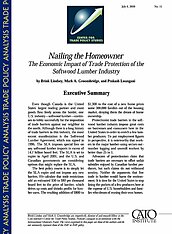The best policy course is to simply let the SLA expire and not impose any new barriers. We calculate that trade restrictions add an estimated $50 to $80 per thousand board feet to the price of lumber, which drives up costs and shrinks profits for lumber users. The resulting addition of $800 to $1,300 to the cost of a new home prices some 300,000 families out of the housing market, denying them the dream of home ownership.
Protectionist trade barriers in the softwood lumber industry impose great costs on businesses and consumers here in the United States in order to enrich a few lumber producers. To put employment figures in perspective, it is noteworthy that workers in the major lumber-using sectors outnumber logging and sawmill workers by better than 25 to 1.
Advocates of protectionism claim that trade barriers are necessary to offset unfair subsidies enjoyed by Canadian lumber producers, but such claims do not withstand scrutiny. Neither do arguments that free trade in lumber would harm the environment. It is time for the United States to stop lining the pockets of a few producers here at the expense of U.S. homebuilders and families who dream of owning their own homes.

